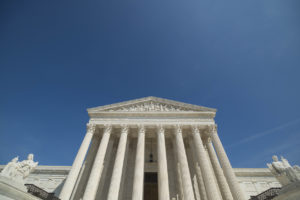On October 3, 2018, the United States Supreme Court held oral argument for New Prime Inc. v. Oliveira, No. 17-340, a case concerning Section 1 of the Federal Arbitration Act (“FAA”). Section 1 of the Federal Arbitration Act (“FAA”) provides that the FAA does not apply “to contracts of employment of seamen, railroad employees, or any other class of workers engaged in foreign or interstate commerce.” 9 U.S.C. § 1. Specifically, the Court is addressing two issues: (1) whether a court or an arbitrator must determine the applicability of Section 1; and (2) whether Section 1 of the FAA’s exemption for contracts of employment includes, as a matter of law, independent contractor agreements. The underlying dispute arises from an independent contractor agreement between the parties pursuant to which Oliveira’s trucking company,located in Missouri, provided services to New Prime, a national trucking company. The underlying agreement specifically stated that there was no employer/employee relationship created between the parties and that any disputes would be resolved through arbitration. Subsequent to entry into the agreement, a dispute over the rate of payment arose and Oliveira joined in a class action under, inter alia, the Fair Labor Standards Act. New Prime sought to compel arbitration and Oliveira opposed, contending, among other things, that the FAA barred arbitration because it was a contract of employment. The Fifth Circuit affirmed the district court’s decision that the court, not the arbitrator, was to decide whether Section 1 of the FAA was applicable and that independent contractor agreements fell within the purview of the FAA’s Section 1 exemption.
On appeal, New Prime argued that courts must give deference to arbitration clauses under the FAA and uphold prior court precedent creating a “presumption of arbitrability.” As such, arbitrators should be able to decide this threshold jurisdictional issue. Oliveira’s response to this argument—that this question in the first instance should be decided by the court and not the arbitrator—was adopted by the lower courts. Oliveira contends that while parties may delegate some threshold issues to the arbitrators, arbitrability covers which issues have been submitted to arbitration, but not all potential threshold issues, such as the application of the FAA.
With respect to the second issue, whether Section 1 of the FAA’s exemption for contracts of employment includes, as a matter of law, independent contractor agreements, New Prime argues the applicability of the FAA to an independent contractor agreement is outside the scope of the exemption provided by Section 1. New Prime advances a narrow reading of this exemption and points to the underlying purpose of the FAA, which was to balance judicial hostility to arbitration agreements in general. For purposes of comparison, New Prime identifies other statutes in which the ADR-related provisions governing employment-related disputes did not include independent contractor agreements. New Prime presents an interesting analysis of the literal meaning of employment agreement terms, including, but not limited to, citations to Black’s Law Dictionary, which defines an employment contract as one between an employer and employee, and does not include independent contractor agreements. In response, Oliveira argued that the FAA does not define the term “employment contract” and that the plain meaning should be utilized in rendering any determination. Further, Oliveira points to language from other Supreme Court cases where the term contracts of employment were found to include independent contractor agreements. Moreover, Oliveira refers to other statutes enacted contemporaneously with the FAA, wherein similar interpretations, or definitions, support this proposition.
Additional parties have filed amicus briefs, such as the Customized Logistics and Delivery Association—they raise a concern that excluding independent contractors from using arbitration will impact other sectors of the transportation industry and may result in significant cost increases in the transportation industry. The Chamber of Commerce and the Society for Human Resource Management also submitted amicus briefs supporting New Prime, and cautioned that consumers will bear the brunt of any increase in costs due to the unavailability of arbitration as an option to resolve certain disputes.
Follow up next month for the decision of the Court, as well as for additional information on the second case slated for oral argument on October 29, 2018, Lamps Plus, Inc. v. Varela, No. 17-988.
By Leslie Ann Berkoff











